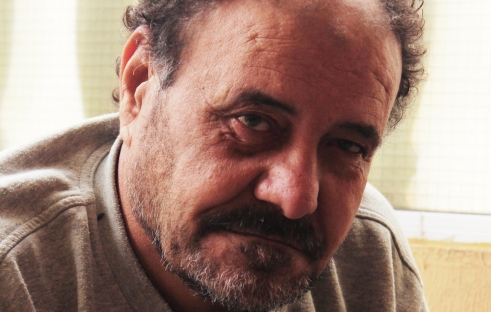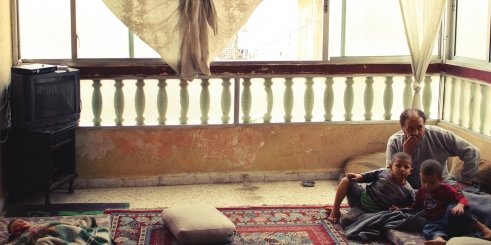
(c) Sandra Kastoun/HelpAge International
Ahmad is a refugee from Syria now living in Tyre, Lebanon
By Ed Knight
“We don’t support either side in the conflict. We came here to escape it,” said Ahmad, a Syrian farmer who fled to Lebanon with his family.
“Now there’s nothing but killing and stealing.”
Ahmad, 58, is one of the war’s 4.8 million refugees. As with many crises, life is particularly tough for older people like him. They are often unable to escape due to the physical hardship involved and mobility issues mean they are sometimes reluctant to leave their homes. Consequently, only 2.9% of registered Syrian refugees are aged 60 and over.
“In conflict situations and when communities are displaced, older people often become separated from their families and find it difficult to access essential services such as food, water and healthcare,” said Frances Stevenson, head of the humanitarian team at HelpAge International.
“Many rely on family for support and are very vulnerable without them.”
HelpAge’s new healthcare programme
As the conflict enters its sixth year, HelpAge International will be working to support older refugees by launching a healthcare programme in Lebanon. The project, supported by HelpAge Deutschland and the German government, will improve access to treatment of age-related illnesses such as diabetes and hypertension over the next three years, helping nearly 2,000 older refugees each month.
HelpAge will provide training on older people’s needs, medicine and upgrade existing medical facilities to be more age-friendly. We will monitor patients and promote healthy behaviour, such as giving up smoking and regular exercise.
Older people in Syria are among those most at risk during sieges, denied aid, and face poverty and health problems, but those who manage to escape the country face new challenges.

(c) Sandra Kastoun/HelpAge International
Ahmad lives with his family and relies on them for support
“There’s nothing I regret in life,” said Ahmad. “If you haven’t experienced anything good then there’s nothing to regret losing. I’ve not experienced anything I’ve felt proud of. Maybe I will in the future but not today.”
There’s a palpable sense of distress in Ahmad’s story, and his experience is shared by many like him.
A 2014 report by HelpAge and Handicap International, Hidden Victims of the Syrian Crisis, shows that older refugees are disproportionately affected, with 65% of those surveyed exhibiting signs of psychological distress. This is three times more than the general refugee population. Older refugees say they experience fear, anger, depression and feelings of hopelessness.
Much of Ahmad’s distress stems from his current situation. “There’s no money for sick people to be treated,” he said.
“If I want to go to the bathroom I need two people to help me. Between money and health problems, there’s not a single good day.”
Mental health among Syria’s older refugees
Among the refugees surveyed, four main causes of psychological distress were commonly reported:
- Traumatic experiences.
- Lack of a sense of ‘daily life’.
- Growing insecurity.
- A loss of dignity stemming from being in a position of dependency.
Ahmad’s need for help whenever he goes to the bathroom typifies this final point.
HelpAge currently provides psychosocial services for older refugees in Lebanon through group counselling, activity sessions, and social events to reduce stress and build social connections.
Where mental and physical ailments intersect
On top of their mental health, many older refugees suffer from physical ailments. The same report found that 54% of older refugees surveyed suffer from non-communicable diseases such as cancer, diabetes, cardiovascular disease and hypertension.
The likelihood of being diagnosed with such a disease increases with age. For older Syrian refugees, this, coupled with limited access to healthcare, puts them at particular risk.
HelpAge has been working with older Syrian refugees in Lebanon since 2013. To date, we have provided:
- screening for more than 3,000 patients for type 2 diabetes and hypertension
- medical consultations for more than 2,000 patients
- classes on health, nutrition and cooking
- social events.
We have also coordinated training for humanitarian and government workers on older people’s health needs.
HelpAge has called for long-term funding recognising vulnerable groups and their particular needs. Last month’s high-level donor conference in London raised over US$11 billion in pledges for the next four years.
Help us to provide assistance to older people like Ahmad and make a donation to HelpAge today. You can also find out more about our work in response to the Syria crisis.
